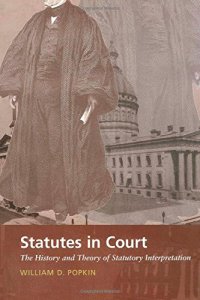
Ebook: Statutes in Court: The History and Theory of Statutory Interpretation
Author: William D. Popkin
- Tags: Legal Profession, Legal Education, Law, Legal History, Law, Reference, Almanacs & Yearbooks, Atlases & Maps, Careers, Catalogs & Directories, Consumer Guides, Dictionaries & Thesauruses, Encyclopedias & Subject Guides, English as a Second Language, Etiquette, Foreign Language Study & Reference, Genealogy, Quotations, Survival & Emergency Preparedness, Test Preparation, Words Language & Grammar, Writing Research & Publishing Guides, Law, Business Law, Constitutional Law, Criminal Law, Legal Reference, Tax Law, New Used &
- Year: 1999
- Publisher: Duke University Press
- Language: English
- pdf
How do judges determine the meaning of laws? The extent to which judges should exercise their discretion in interpreting legislation has been a contentious issue throughout American history, involving questions about the balance of power between the legislature and the judiciary. In Statutes in Court William D. Popkin provides an indispensable survey of the history of American statutory interpretation and then offers his own theory of “ordinary judging” that defines the proper scope of judicial discretion.
Popkin begins by discussing the British origins of statutory interpretation in this country. He then maps the evolving conceptions of the judicial role in the United States from Revolutionary times through the twentieth century before presenting his “ordinary judging” theory—one that asks the judge to use modest judicial discretion to assist the legislature in implementing good government. Claiming that theory cannot account for everything a judge does when determining statutory meaning or writing an opinion, Popkin shows how judges who strive to be conscientious in interpreting the law are often hampered by the lack of both a framework in which to fit their approach and a well-understood common vocabulary to explain what they do. Statutes in Court fills that gap.
This work will be valuable to anyone concerned about the judicial role in the interpretation of laws—from judiciary officials and law professors to legal historians and political scientists.
Popkin begins by discussing the British origins of statutory interpretation in this country. He then maps the evolving conceptions of the judicial role in the United States from Revolutionary times through the twentieth century before presenting his “ordinary judging” theory—one that asks the judge to use modest judicial discretion to assist the legislature in implementing good government. Claiming that theory cannot account for everything a judge does when determining statutory meaning or writing an opinion, Popkin shows how judges who strive to be conscientious in interpreting the law are often hampered by the lack of both a framework in which to fit their approach and a well-understood common vocabulary to explain what they do. Statutes in Court fills that gap.
This work will be valuable to anyone concerned about the judicial role in the interpretation of laws—from judiciary officials and law professors to legal historians and political scientists.
Download the book Statutes in Court: The History and Theory of Statutory Interpretation for free or read online
Continue reading on any device:

Last viewed books
Related books
{related-news}
Comments (0)